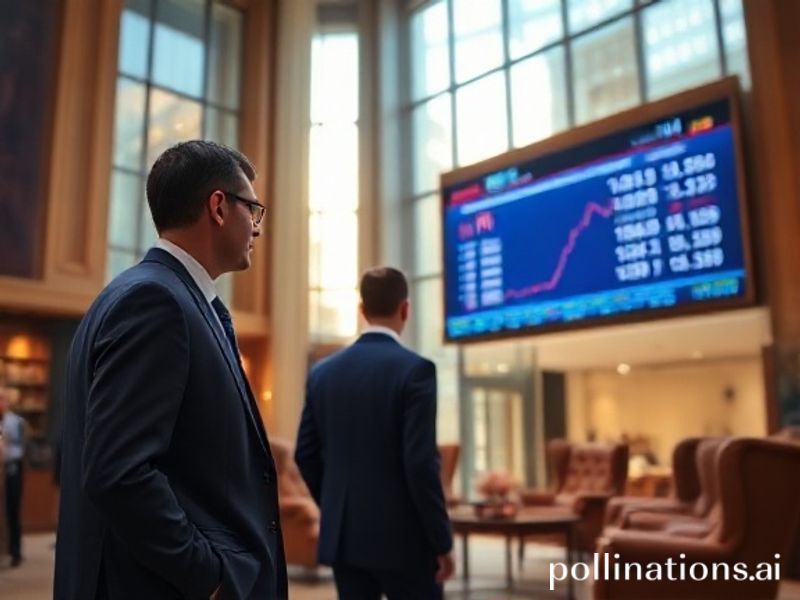RH Stock: How a Couch Company Became the World’s Most Honest Geopolitical Barometer
RH Stock: A Global Game of Musical Chairs Where the Tune Keeps Changing
By Dave’s International Bureau of Schadenfreude
If you squint hard enough from the rooftop bar of any five-star hotel in Dubai, you can almost see the gravitational pull that RH—once the quaintly named Restoration Hardware—now exerts on the planet’s moneyed classes. The stock, ticker RH, has become less a proxy for high-end sectional sofas and more a leveraged bet on how many Russian oligarchs, Chinese tech heirs, and newly minted Gulf sovereign-wealth nephews still feel like redecorating their third homes. It’s capitalism’s version of Feng Shui: rearrange the furniture, rearrange global liquidity.
Let’s zoom out. RH’s latest earnings call was a masterclass in geopolitical ventriloquism. CEO Gary Friedman blamed “macro headwinds”—a polite euphemism for the fact that the French Riviera is running low on available berths and London’s mansion tax is making Mayfair feel like a dentist’s waiting room. Translation: the same clientele who once ordered $20,000 cloud beds with the casualness of a late-night pizza are now discovering that yachts depreciate faster than the ruble. Who knew?
The company’s pivot to “guesthouses”—RH-speak for branded boutique hotels in places like Aspen and Gstaad—turns inventory into lodging. It’s a clever sleight of hand: if no one is buying the $12,000 Belgian-linen chaise, at least they can rent the room it’s sitting in for €3,000 a night and post it on Instagram. Somewhere, an ESG fund manager is furiously scribbling notes on “circular economy.” Meanwhile, European energy traders are booking suites just to keep warm this winter, which counts as both a humanitarian gesture and a hedge.
Across the Pacific, RH’s Shanghai members-only gallery sits half-empty, not because tastes have changed but because half the target demographic is busy attending “self-reflection” sessions in windowless conference rooms. Beijing’s crackdown on conspicuous consumption has turned ostentation into a contact sport: one wrong WeChat post and your social-credit score drops faster than RH’s same-store sales. Still, the company keeps one eye on the long game, convinced that once the Party’s austerity fever breaks, the new elite will want sofas wide enough for extended family guilt trips.
Then there’s the American side of the story, where RH’s stock chart looks like a cardiogram of national denial. Each dip is met with bullish notes from analysts who still believe the U.S. consumer is merely “taking a breather” between stimulus checks. Their optimism is almost sweet—like watching a waiter assure you the soufflé is “just resting” while the kitchen burns down. Sure, mortgage rates at 7% may have frozen the housing market, but nothing says resilience like buying a $6,000 chandelier on credit while refinancing your soul.
Globally, RH has become a mirror in a funhouse: every region sees its own distorted reflection. LatAm crypto-millionaires convert volatile stablecoins into Italian marble tables because nothing says “store of value” like a 400-pound Tuscan travertine. Gulf sovereign funds view RH as a diversification play against oil, which is ironic considering the carbon footprint of shipping a handcrafted walnut sideboard from California to Riyadh by way of Rotterdam. Somewhere, Greta Thunberg just developed a twitch.
And yet, the stock persists. Short sellers keep predicting doom, citing stretched valuations and a consumer recession that refuses to arrive on schedule—like a dinner guest who’s both late and armed. Each quarter, RH beats lowered expectations just enough to keep the narrative alive. It’s financial whack-a-mole with Italian leather.
So what does RH ultimately tell us about the state of the world? That we’d rather bet on aspirational upholstery than confront the fraying seams beneath. That in an era of supply-chain snarls and war-driven inflation, the final luxury is pretending your living room can still be a sanctuary. And that somewhere, in a climate-controlled warehouse outside Modena, thousands of unsold cloud beds lie in plastic wrap, dreaming of a future that may never quite arrive—just like the rest of us.







